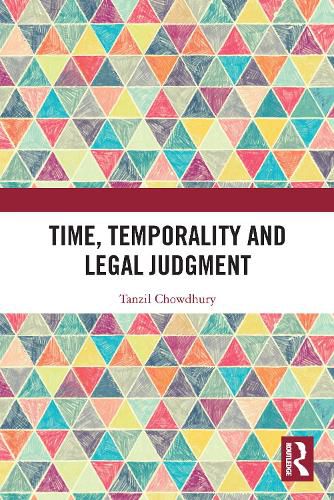Readings Newsletter
Become a Readings Member to make your shopping experience even easier.
Sign in or sign up for free!
You’re not far away from qualifying for FREE standard shipping within Australia
You’ve qualified for FREE standard shipping within Australia
The cart is loading…






This book challenges the correspondence theory of judicial fact construction - that legal rules resemble and subsume facts ‘out there’ - and instead provides an account of judicial fact construction through legally produced times- or adjudicative temporalities- that structure legal subject and event formation in legal judgement.
Drawing on Bergsonian and Gadamerian theories of time, this book details how certain adjudicative temporalities can produce fully willed and autonomous subjects through ‘time framed’ legal events - in effect, the paradigmatic liberal legal subject - or how alternative adjudicative temporalities may structure legal subjects that are situated and constituted by social structures. The consequences of this novel account of legal judgement are fourfold. The first is that judicial fact construction is not exclusively determined by the legal rule (s) but by adjudication’s production of temporalities. The second is that the selection between different adjudicative temporalities is generally indeterminate, though influenced by wider social structures. As will be argued, social structures, framed as a particular type of past produced by certain adjudicative temporalities, may either be incorporated in the rendering of the legal event or elided. The third is that, with the book’s focus on criminal law, different deployments of adjudicative temporalities effect responsibility ascription. Finally, it is argued that the demystification of time as that which structures event and subject formation reveals another way in which to uncover the politics of legal judgement and the potential for its transformative potential, through either its inclusion or its elision of social structures in adjudication’s determination of facts.
This book will be of interest to students and scholars in the field of legal judgement, legal theory and jurisprudence.
$9.00 standard shipping within Australia
FREE standard shipping within Australia for orders over $100.00
Express & International shipping calculated at checkout
This book challenges the correspondence theory of judicial fact construction - that legal rules resemble and subsume facts ‘out there’ - and instead provides an account of judicial fact construction through legally produced times- or adjudicative temporalities- that structure legal subject and event formation in legal judgement.
Drawing on Bergsonian and Gadamerian theories of time, this book details how certain adjudicative temporalities can produce fully willed and autonomous subjects through ‘time framed’ legal events - in effect, the paradigmatic liberal legal subject - or how alternative adjudicative temporalities may structure legal subjects that are situated and constituted by social structures. The consequences of this novel account of legal judgement are fourfold. The first is that judicial fact construction is not exclusively determined by the legal rule (s) but by adjudication’s production of temporalities. The second is that the selection between different adjudicative temporalities is generally indeterminate, though influenced by wider social structures. As will be argued, social structures, framed as a particular type of past produced by certain adjudicative temporalities, may either be incorporated in the rendering of the legal event or elided. The third is that, with the book’s focus on criminal law, different deployments of adjudicative temporalities effect responsibility ascription. Finally, it is argued that the demystification of time as that which structures event and subject formation reveals another way in which to uncover the politics of legal judgement and the potential for its transformative potential, through either its inclusion or its elision of social structures in adjudication’s determination of facts.
This book will be of interest to students and scholars in the field of legal judgement, legal theory and jurisprudence.